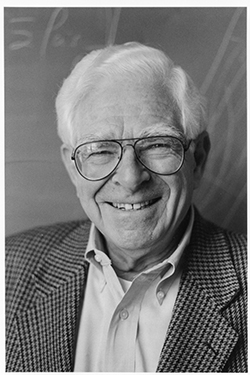
Ronald Probstein, professor emeritus of mechanical engineering at MIT, passed away at the age of 93 on September 19. Probstein was a leading expert in fluid mechanics. His research advanced a number of fields including spacecraft design, hypersonic flows, desalination, and the removal of toxic waste from soil.
Born and raised in New York City, Probstein worked for the mathematician Richard Courant while studying for his bachelor’s degree at night at New York University. After receiving his master’s degree and PhD from Princeton University, he joined the faculty at Brown University as assistant professor of engineering and applied mathematics in 1954.
“Probstein was promoted by the farsighted Chair Dan Drucker to full professor before he turned thirty,” recalled Brown Professor Emeritus of Engineering Joseph T.C. Liu. “When I was a grad student at Caltech I was impressed by several of the grad students that came from Brown that claimed to have been sent by Probstein. Ronnie was known to be a benevolent scholar dedicated to helping young people as well as his colleagues.”
In 1962, he joined the faculty of MIT’s Department of Mechanical Engineering, where he would spend the remainder of his career.
“Ronnie Probstein had a quick wit and a remarkable ability to see situations from an original perspective,” said Brown Professor Emeritus of Engineering Barrett Hazeltine. “Behind an intimidating expression, was a kind heart.”
Many of Probstein’s research contributions had impact in the field of aeronautics. His work in fluid dynamics informed early spacecraft design and deepened the understanding of the physics behind ballistic missile reentry. Alongside Wallace Hayes, Probstein co-authored the book "Hypersonic Inviscid Flow," which is recognized as a highly influential work in the field of hypersonic flight. His interest in aerodynamics extended beyond the manufactured to celestial objects. He proposed a theory on the behavior and shape of the tails of dust that trail behind comets.
Probstein also developed solutions for problems related to the health of the planet. He conducted research in the development of synthetic fuels as well as advanced desalination and water purification technology. In the 1990s, he patented a method for the removal of toxic contaminants in soil — a process known as electrokinetic soil remediation.
A prolific writer, Probstein wrote a number of books and over 125 research articles. His book, "Physicochemical Hydrodynamics: An Introduction," was selected as a Best Engineering Book by the Association of American Publishers. More recently, he wrote a non-research related book about the life of his father, “Honest” Sid Probstein, entitled "Honest Sid: Memoir of a Gambling Man."
Throughout his career, Probstein was awarded a number of prestigious honors. In 1989, he was appointed as Ford Professor of Engineering at MIT. He was a fellow of the American Academy of Arts and Sciences, American Institute of Aeronautics and Astronautics, American Physical Society, American Association for Advancement of Science, and American Society of Mechanical Engineers, in addition to being a member of both the National Academy Engineering and National Academy of Sciences. In 1997 as part of the 150th anniversary celebration of engineering at Brown, he received an honorary Doctor of Science degree from the university.
Probstein is survived by his beloved wife Irene (Weindling) Probstein, his son Sid Probstein, daughter-in-law Laurie (Greer) Probstein, and his three grandchildren.
- Courtesy of Mary Beth Gallagher, MIT Department of Mechanical Engineering